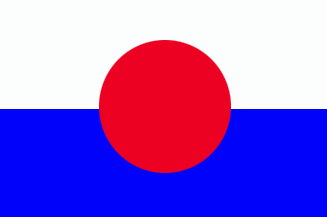 image by Jaume Ollé, 15 September 1996
image by Jaume Ollé, 15 September 1996

Last modified: 2011-06-10 by ian macdonald
Keywords: chin | myanmar | kuki | zale n-gam | zo | zomi |
Links: FOTW homepage |
search |
disclaimer and copyright |
write us |
mirrors
 image by Jaume Ollé, 15 September 1996
image by Jaume Ollé, 15 September 1996
See also:
According the Flag Bulletin the Chin Republic (and probably the Liberation Movement) flies this flag.
Jaume Ollé, 15 September 1996
Picture 155 in Encyclopaedia Universalis "Zoram [Chin State] (Zomi ['Chins']) - Burma."
Similar to the above, but with lighter blue and smaller disk.
Ivan Sache, 16 September 1999
The initial draft of the Chinland
constitution is now available. The flag is regulated in the chapter XII article
102, but it is not decided yet, neither is the national anthem, nor the coat of
arms.
Jaume Ollé, 28 April 2001
Chinland is a Burmese self-determination/secessionist movement, described at
http://www.chinland.org/
George Cruickshank, 29 April 2001
Chinland includes all the Mizo/Zozam/etc areas some of which are in India or
Bangladesh.
Jonathan Dixon, 29 April 2001
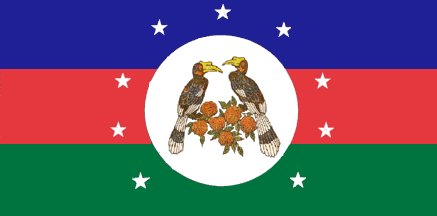 based on the Zomi Momno
Association home page, 17 February 2006
based on the Zomi Momno
Association home page, 17 February 2006
The Zomi Momno Association
home page shows two flags, one listed as the Zo flag (Chin State). It is a
blue-red-green horizontal tricolour, with a central disk showing perching
hornbills on a flowering bush. Around the disk are 9 white stars. A
variant of this flag shows a disk with one
bird, and 6 stars. Another variant shows
one bird, no branch, and 9 stars.
located by Valentin Poposki, 17 February 2006
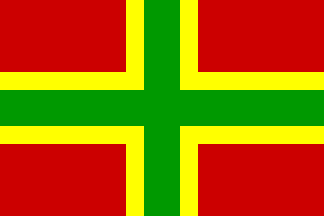 image by Daniel Markstedt, 3 September 2006
image by Daniel Markstedt, 3 September 2006
The Zomi Re-unification Organisation aims to unify the Zo people (variously known as Chin, Kuki, Lushai etc) of Myanmar, Bangladesh and India. Their website presents a proposed national flag described as follows:
"The Zomi national flag has a a red background upon which are laid
two full-stretched upright crosses, an inner green coloured cross
surrounded by an outer yellow cross.
Significance of the colours:
RED - Sacrifice
YELLOW - Victory
GREEN - Prosperity"
Source: http://www.zogam.org/organisation.asp?article=organisation_36
Daniel Markstedt, 3 September 2006
The specs seem to be (4+1+2+1+4):(7+1+2+1+7) = 2:3
António Martins-Tuválkin, 3 September 2006
Editors note: In July 1999, Jarig Bakker did some research on the Chin people of Myanmar and found the following information and flag from sources no longer available on the web.
I have paged around in several websites on the Chin (and other peoples) of Myanmar - I chose this account among several to shed some light (or obscure the issue even more) at : http://www2.tky.3web.ne.jp/~thawng/
'Historical Background
the term "chin" is an old Burmese word for "fellow" "companion" or "friend". The term "Chin" and "Chindwin" (it means the hole of the Chins) are mentioned int he Pagan inscriptions from the beginning of the 13th century AD. the term "Chin" is designated to the various hill tribes of the Chin State of the Union of Myanmar (Burma), the Mizos of Assam State of India, some of the hill tribes of Chittagong hill tracts of Bangladesh and the "Thados" of Manipur State. The tribes are also found in Rakhaing State, Thayer, Minbu, and Pyinmana districts. To the Indians they are known as "Kukis" (meaning hill man) and "Nagas" (meaning naked). Unfortunately, none of them recognise the term "Chin" though officially recognised and accepted so far, nor do they like to be called "Chin". They prefer to call themselves in their trible names as Laimi, Zomi, Mizo, Asho, Cho, Mro, Khumi...etc. (Ref; Notes on the Chin Language by U Van Kyi)'
It appears to me that the Chin do not have a uniform name for their people/tribe and that that is fully exploited by the outside world to confound the issue.
In an article I plucked from the web, but lost the URL:
Stephen Epstein reports of a visit to the 'Bnei Menashe', part of the Kuki tribe in Mizoram (India) that still retain Jewish rites. 'More that 300 Bnei Menashe have gone to Israel, where they have undergone conversion and have settled with the help of Rabbi Avichail and Amishav. Many live in the Gush Katif area, work in agriculture and serve in the army.'
Similar (according to me far-fetched) stories go around... I mentioned the last one to eventually account for the MD on the Chin flag - But it is very spurious.
Jarig Bakker19 July 1999
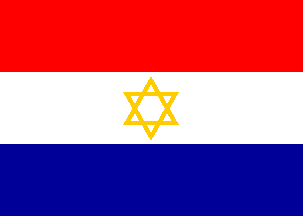 image by Antonio Martins, 17 December 1999
image by Antonio Martins, 17 December 1999
Photo of the Chin national flag was published in my Bulletin (issue 1) and is similar to this one but the central star is full yellow (or golden) instead of a Magen David pattern.
Jaume Ollé, 26 July 1999
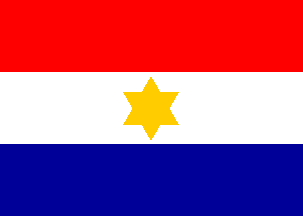 image by Antonio Martins, 17 December 1999
image by Antonio Martins, 17 December 1999
Redrawn into standards keeping the unusual ratio of ~5:7. Also sent version based on Jaume Ollé's description. Now, I guess that those Chins sre supposed to know their flag best, and their site should be trusted, but OTOH, Jaume certainly has a good source for his version and it wouldn't be the first official website using a grossly incorrect image of their own flag.
Antonio Martins, 17 December 1999
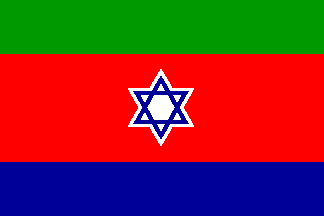 image by Antonio Martins, 17 December 1999
image by Antonio Martins, 17 December 1999
I saw yesterday in a program on A&E called "Quest for the Lost Tribes" the flag of a people called the "Manmasseh" or "Manasseh". This people lives in the states of Manipur and Mizoram near the India-Burma border and they allege that they belong to the tribe of Manasseh, which is one of the 10 lost tribes of Israel. They display a flag that has three horizontal stripes: green, red, and blue. The red stripe is double the width of the other two stripes. At the center of the red stripe there is a blue star of David on a white background. The white background has the same contour as the star. The size seems to be 2:3.
Victor Quinones, 18 April 2000
This seems to be connected with our discussion of the Chin people flag, in July
99 and again in December 99, though the design is different. The flags here are
based on the Chin website at
http://www.angelfire.com/in/chinland/chinflag.html
António Martins, 20 April 2000
The flag shown here is an authentic one, but misattributed, I guess in part due to our general ignorance of this obscure region of the world, beautiful, and at the same time engulfed in the terrible turmoil and shielded well from the outside scrutiny by the Indian regime. After exchanging considerable correspondence with Mr. Neh Thang Kuki, moderator of the Kuki International Forum , it became clear the above mentioned flag is representing the government of Zale'n-gam, a "wished for" country which is supposed to unite all Kuki (Chin) people who are recently under the Indian, Myanmarese and Bangladeshi occupation. The Kukis of Mizoram are overwhelmingly Christian, but have a fascinating connection with Bnei Menashe, which explains the presence of the "shield of David" on their flag. This is a subject which would take much too much space here, so allow me to direct those interested to few (out of many) websites dealing with it:
http://www.findarticles.com/cf_0/m1061/2_11065014591/print.jhtml with the wonderful story by Hillel Halkin
http://members.tripod.com/adaniel/manipurjews.htm
http://raceandhistory.com/worldhotspots/Indiajews.htm
http://www.hinduunity.org/Jewsofindia.html
http://www.jcpa.org/jl/jl101.htm
http://www.kukiforum.com/ (look under the "religion" for an essay by Yair Sheleg on Menashe of Mizoram)
Chrystian Kretowicz, 5 June 2003
The reason for using the "David Star" does not necessarily mean that we have relations with the Jews. As a predominant Christian society, we have gospel songs and other hymns which mention the "David Star". The star symbolizes the savior of the world, Jesus. It is our belief that this "David Star" also interpreted as "Morning Star" will prevail all the enemies our Lord Jesus Christ one day, sooner or later. In other words, we could also say that the star is the symbol of strength which represents the King of Kings, Lord of Lords.
In regard to the other two flags, shown above, I would be honest to comment that people in that part of the world have proposed their own flags in the name of their respective organizations. There are countless parties and organizations in that region. However, as these people do not have sovereign country, it is hard to tell which one is the choice of the public. Time will decide the appropriate flags for these people.
In the meantime, history and legends prove that "Kuki, Chin & Mizo (Zomi) are said to be very closely related families. If one makes a thorough research, he could still find more flags among these people. Honestly speaking, within the Kuki itself, there are a number of flags. The flag I represented was the choice of the majority of our people for now. Before submitting the flag, we had extensive discussions on the matter. That is why the submission was done lately.
I also confirm that the flag of Zale'n-gam was also adopted by KNO - - Kuki National Organization and its armed forces - KNA - Kuki National Army.
Neh Thang Kuki, 13 June 2003
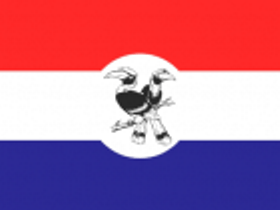 image located by Aleksandar Nemet, 13 January 2010
image located by Aleksandar Nemet, 13 January 2010
At http://www.chinland.org/ is a flag
that incorporates the red-white-blue of the flag with the Star of David in
middle and the Zo flag
presented with two birds in middle. It is titled
as the Chin national flag
Aleksandar Nemet, 13 January 2010